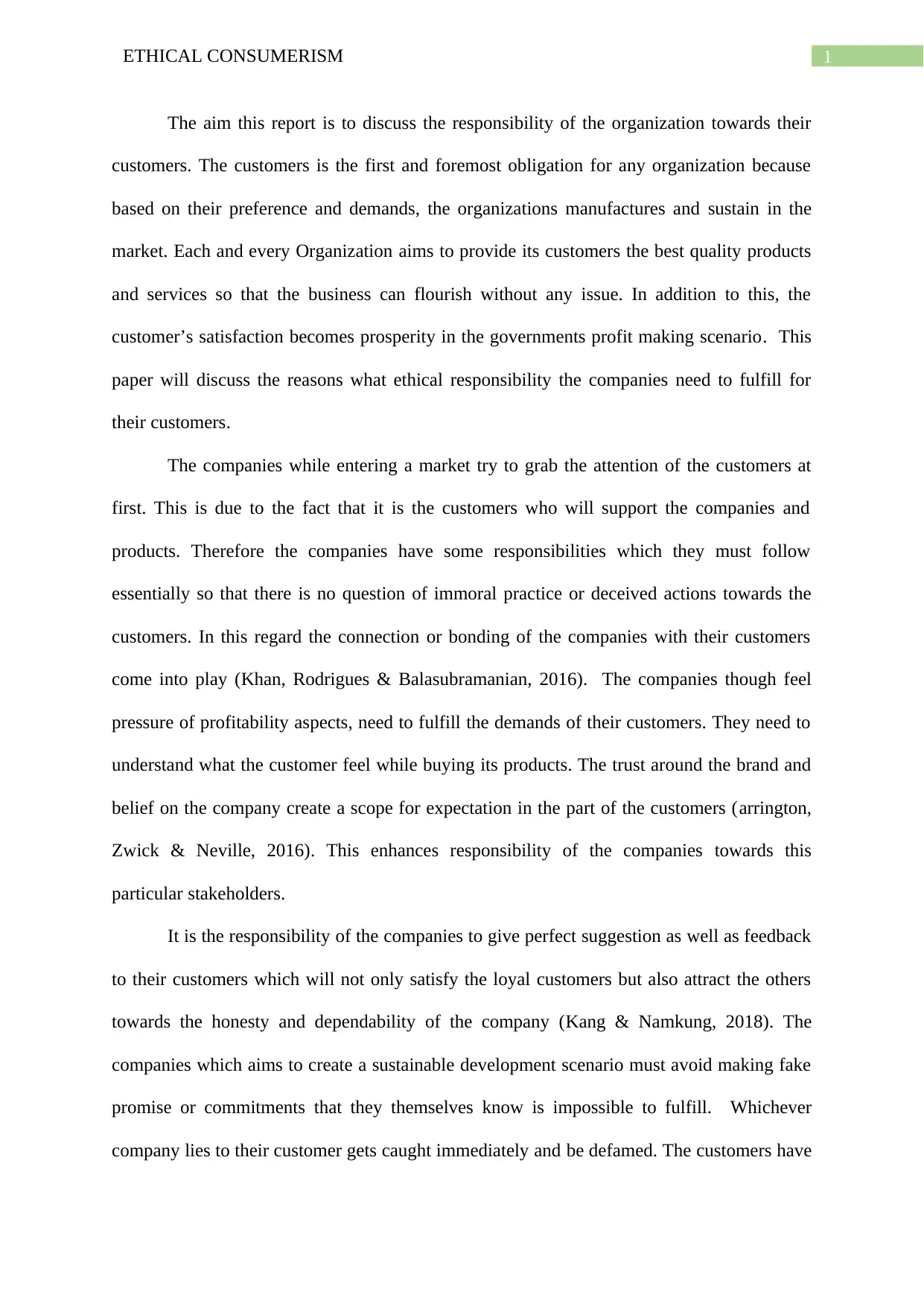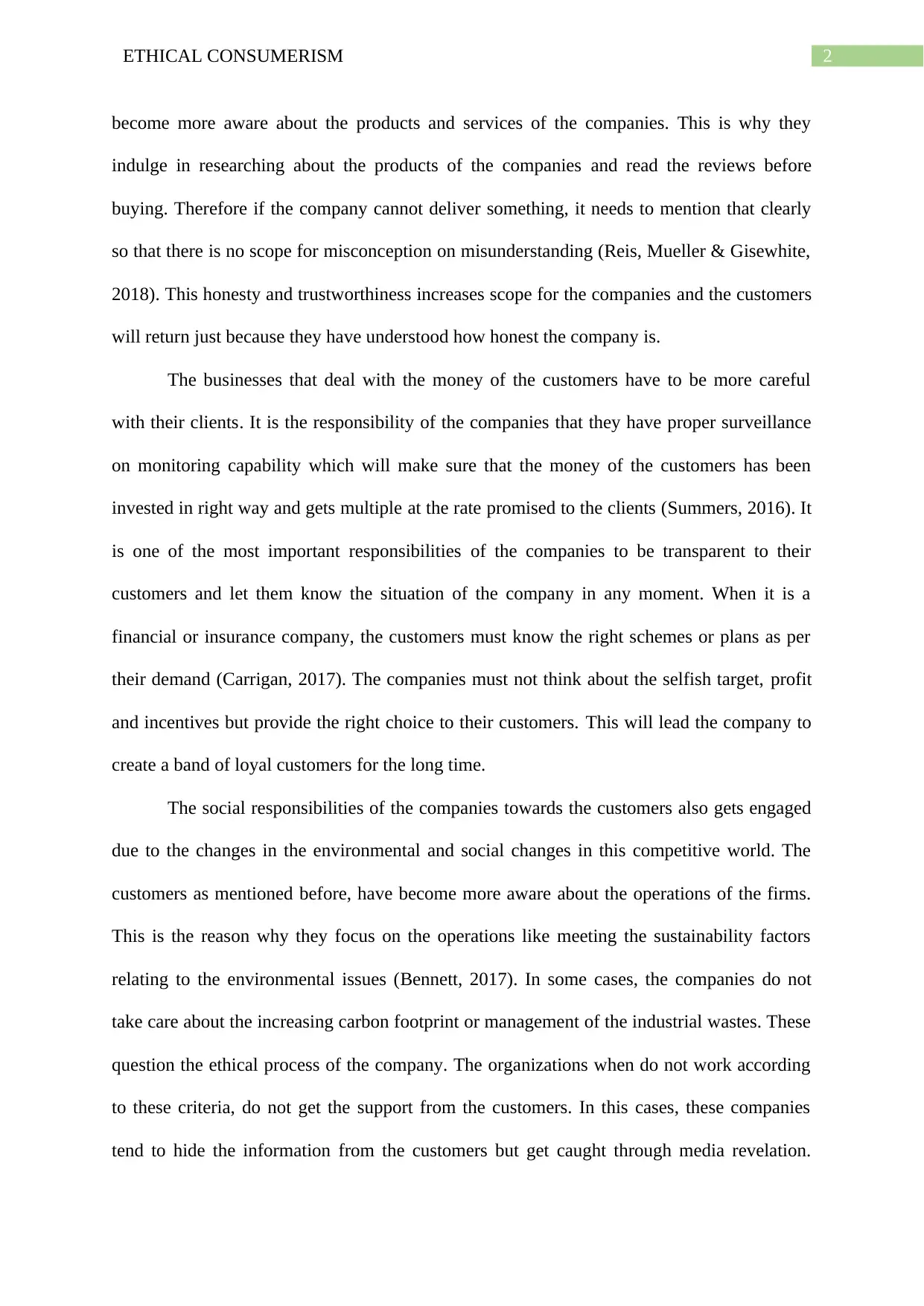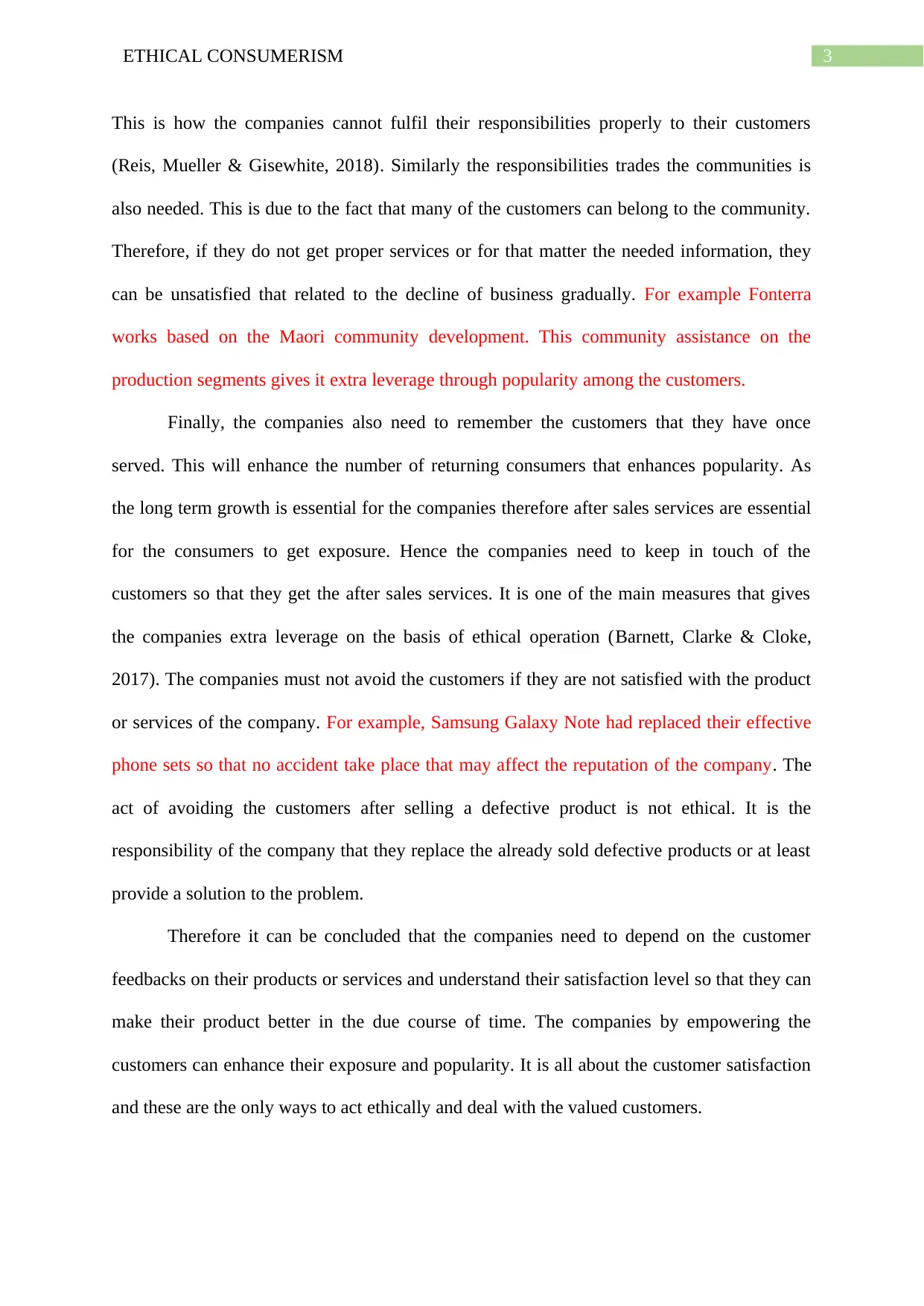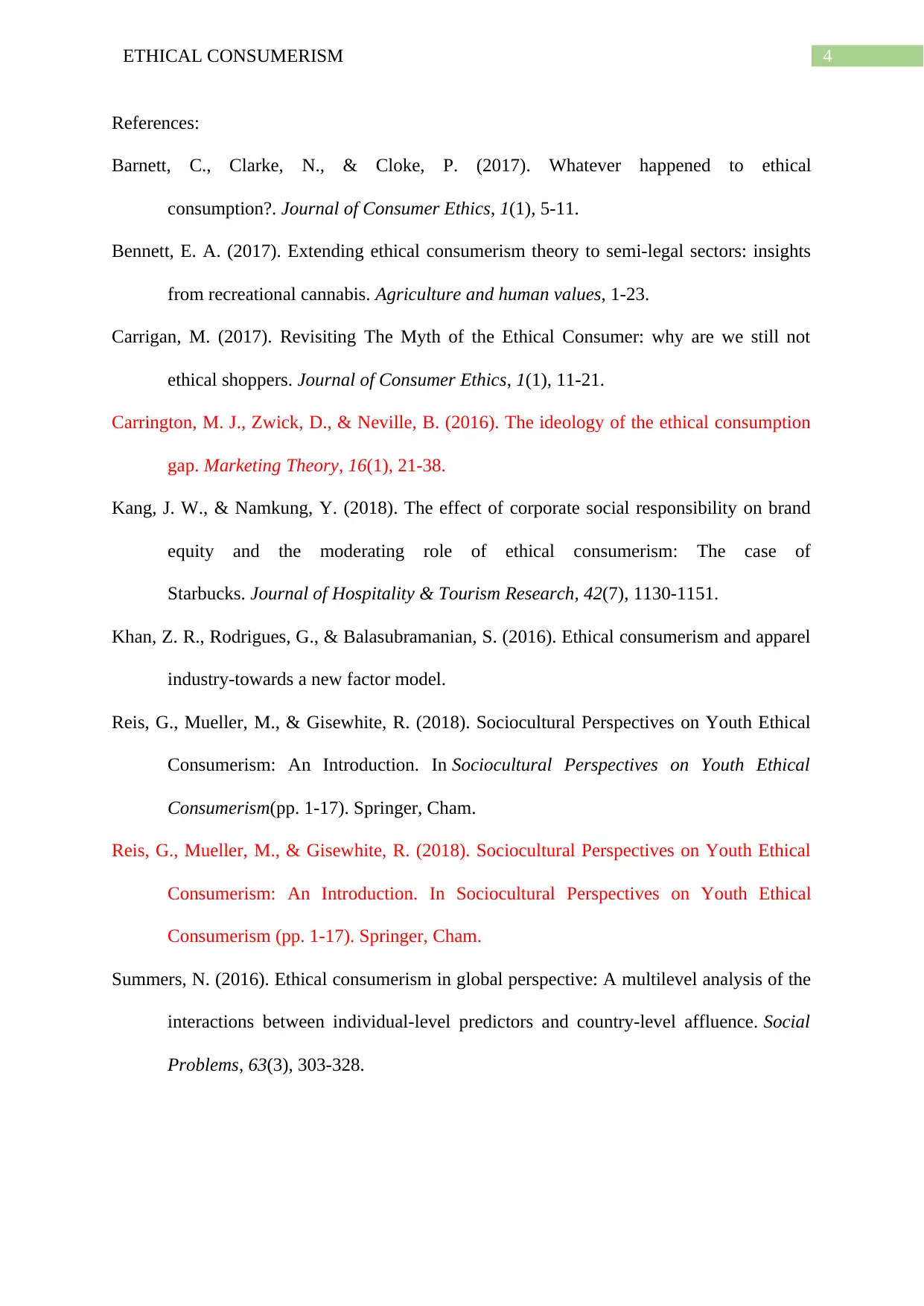Ethical Consumerism: Company Responsibilities and Customer Trust
VerifiedAdded on 2023/02/01
|5
|1495
|82
Report
AI Summary
This report examines the ethical responsibilities of organizations towards their customers, emphasizing that customer satisfaction is paramount for business success. It explores how companies build trust by fulfilling customer demands, providing honest information, and ensuring the ethical handling of customer finances. The report highlights the importance of transparency, especially in financial and insurance sectors, and the need for companies to address environmental and social concerns, including sustainability and community engagement. It underscores the significance of after-sales services, handling customer complaints ethically, and adapting to customer feedback to improve products and services. The ultimate goal is to empower customers and foster long-term business growth through ethical practices and customer-centric approaches. The report references various academic sources to support its arguments.

Running head: ETHICAL CONSUMERISM
ETHICAL CONSUMERISM
Name of the Student:
Name of the University:
Author Note:
ETHICAL CONSUMERISM
Name of the Student:
Name of the University:
Author Note:
Paraphrase This Document
Need a fresh take? Get an instant paraphrase of this document with our AI Paraphraser

1ETHICAL CONSUMERISM
The aim this report is to discuss the responsibility of the organization towards their
customers. The customers is the first and foremost obligation for any organization because
based on their preference and demands, the organizations manufactures and sustain in the
market. Each and every Organization aims to provide its customers the best quality products
and services so that the business can flourish without any issue. In addition to this, the
customer’s satisfaction becomes prosperity in the governments profit making scenario. This
paper will discuss the reasons what ethical responsibility the companies need to fulfill for
their customers.
The companies while entering a market try to grab the attention of the customers at
first. This is due to the fact that it is the customers who will support the companies and
products. Therefore the companies have some responsibilities which they must follow
essentially so that there is no question of immoral practice or deceived actions towards the
customers. In this regard the connection or bonding of the companies with their customers
come into play (Khan, Rodrigues & Balasubramanian, 2016). The companies though feel
pressure of profitability aspects, need to fulfill the demands of their customers. They need to
understand what the customer feel while buying its products. The trust around the brand and
belief on the company create a scope for expectation in the part of the customers (arrington,
Zwick & Neville, 2016). This enhances responsibility of the companies towards this
particular stakeholders.
It is the responsibility of the companies to give perfect suggestion as well as feedback
to their customers which will not only satisfy the loyal customers but also attract the others
towards the honesty and dependability of the company (Kang & Namkung, 2018). The
companies which aims to create a sustainable development scenario must avoid making fake
promise or commitments that they themselves know is impossible to fulfill. Whichever
company lies to their customer gets caught immediately and be defamed. The customers have
The aim this report is to discuss the responsibility of the organization towards their
customers. The customers is the first and foremost obligation for any organization because
based on their preference and demands, the organizations manufactures and sustain in the
market. Each and every Organization aims to provide its customers the best quality products
and services so that the business can flourish without any issue. In addition to this, the
customer’s satisfaction becomes prosperity in the governments profit making scenario. This
paper will discuss the reasons what ethical responsibility the companies need to fulfill for
their customers.
The companies while entering a market try to grab the attention of the customers at
first. This is due to the fact that it is the customers who will support the companies and
products. Therefore the companies have some responsibilities which they must follow
essentially so that there is no question of immoral practice or deceived actions towards the
customers. In this regard the connection or bonding of the companies with their customers
come into play (Khan, Rodrigues & Balasubramanian, 2016). The companies though feel
pressure of profitability aspects, need to fulfill the demands of their customers. They need to
understand what the customer feel while buying its products. The trust around the brand and
belief on the company create a scope for expectation in the part of the customers (arrington,
Zwick & Neville, 2016). This enhances responsibility of the companies towards this
particular stakeholders.
It is the responsibility of the companies to give perfect suggestion as well as feedback
to their customers which will not only satisfy the loyal customers but also attract the others
towards the honesty and dependability of the company (Kang & Namkung, 2018). The
companies which aims to create a sustainable development scenario must avoid making fake
promise or commitments that they themselves know is impossible to fulfill. Whichever
company lies to their customer gets caught immediately and be defamed. The customers have

2ETHICAL CONSUMERISM
become more aware about the products and services of the companies. This is why they
indulge in researching about the products of the companies and read the reviews before
buying. Therefore if the company cannot deliver something, it needs to mention that clearly
so that there is no scope for misconception on misunderstanding (Reis, Mueller & Gisewhite,
2018). This honesty and trustworthiness increases scope for the companies and the customers
will return just because they have understood how honest the company is.
The businesses that deal with the money of the customers have to be more careful
with their clients. It is the responsibility of the companies that they have proper surveillance
on monitoring capability which will make sure that the money of the customers has been
invested in right way and gets multiple at the rate promised to the clients (Summers, 2016). It
is one of the most important responsibilities of the companies to be transparent to their
customers and let them know the situation of the company in any moment. When it is a
financial or insurance company, the customers must know the right schemes or plans as per
their demand (Carrigan, 2017). The companies must not think about the selfish target, profit
and incentives but provide the right choice to their customers. This will lead the company to
create a band of loyal customers for the long time.
The social responsibilities of the companies towards the customers also gets engaged
due to the changes in the environmental and social changes in this competitive world. The
customers as mentioned before, have become more aware about the operations of the firms.
This is the reason why they focus on the operations like meeting the sustainability factors
relating to the environmental issues (Bennett, 2017). In some cases, the companies do not
take care about the increasing carbon footprint or management of the industrial wastes. These
question the ethical process of the company. The organizations when do not work according
to these criteria, do not get the support from the customers. In this cases, these companies
tend to hide the information from the customers but get caught through media revelation.
become more aware about the products and services of the companies. This is why they
indulge in researching about the products of the companies and read the reviews before
buying. Therefore if the company cannot deliver something, it needs to mention that clearly
so that there is no scope for misconception on misunderstanding (Reis, Mueller & Gisewhite,
2018). This honesty and trustworthiness increases scope for the companies and the customers
will return just because they have understood how honest the company is.
The businesses that deal with the money of the customers have to be more careful
with their clients. It is the responsibility of the companies that they have proper surveillance
on monitoring capability which will make sure that the money of the customers has been
invested in right way and gets multiple at the rate promised to the clients (Summers, 2016). It
is one of the most important responsibilities of the companies to be transparent to their
customers and let them know the situation of the company in any moment. When it is a
financial or insurance company, the customers must know the right schemes or plans as per
their demand (Carrigan, 2017). The companies must not think about the selfish target, profit
and incentives but provide the right choice to their customers. This will lead the company to
create a band of loyal customers for the long time.
The social responsibilities of the companies towards the customers also gets engaged
due to the changes in the environmental and social changes in this competitive world. The
customers as mentioned before, have become more aware about the operations of the firms.
This is the reason why they focus on the operations like meeting the sustainability factors
relating to the environmental issues (Bennett, 2017). In some cases, the companies do not
take care about the increasing carbon footprint or management of the industrial wastes. These
question the ethical process of the company. The organizations when do not work according
to these criteria, do not get the support from the customers. In this cases, these companies
tend to hide the information from the customers but get caught through media revelation.
⊘ This is a preview!⊘
Do you want full access?
Subscribe today to unlock all pages.

Trusted by 1+ million students worldwide

3ETHICAL CONSUMERISM
This is how the companies cannot fulfil their responsibilities properly to their customers
(Reis, Mueller & Gisewhite, 2018). Similarly the responsibilities trades the communities is
also needed. This is due to the fact that many of the customers can belong to the community.
Therefore, if they do not get proper services or for that matter the needed information, they
can be unsatisfied that related to the decline of business gradually. For example Fonterra
works based on the Maori community development. This community assistance on the
production segments gives it extra leverage through popularity among the customers.
Finally, the companies also need to remember the customers that they have once
served. This will enhance the number of returning consumers that enhances popularity. As
the long term growth is essential for the companies therefore after sales services are essential
for the consumers to get exposure. Hence the companies need to keep in touch of the
customers so that they get the after sales services. It is one of the main measures that gives
the companies extra leverage on the basis of ethical operation (Barnett, Clarke & Cloke,
2017). The companies must not avoid the customers if they are not satisfied with the product
or services of the company. For example, Samsung Galaxy Note had replaced their effective
phone sets so that no accident take place that may affect the reputation of the company. The
act of avoiding the customers after selling a defective product is not ethical. It is the
responsibility of the company that they replace the already sold defective products or at least
provide a solution to the problem.
Therefore it can be concluded that the companies need to depend on the customer
feedbacks on their products or services and understand their satisfaction level so that they can
make their product better in the due course of time. The companies by empowering the
customers can enhance their exposure and popularity. It is all about the customer satisfaction
and these are the only ways to act ethically and deal with the valued customers.
This is how the companies cannot fulfil their responsibilities properly to their customers
(Reis, Mueller & Gisewhite, 2018). Similarly the responsibilities trades the communities is
also needed. This is due to the fact that many of the customers can belong to the community.
Therefore, if they do not get proper services or for that matter the needed information, they
can be unsatisfied that related to the decline of business gradually. For example Fonterra
works based on the Maori community development. This community assistance on the
production segments gives it extra leverage through popularity among the customers.
Finally, the companies also need to remember the customers that they have once
served. This will enhance the number of returning consumers that enhances popularity. As
the long term growth is essential for the companies therefore after sales services are essential
for the consumers to get exposure. Hence the companies need to keep in touch of the
customers so that they get the after sales services. It is one of the main measures that gives
the companies extra leverage on the basis of ethical operation (Barnett, Clarke & Cloke,
2017). The companies must not avoid the customers if they are not satisfied with the product
or services of the company. For example, Samsung Galaxy Note had replaced their effective
phone sets so that no accident take place that may affect the reputation of the company. The
act of avoiding the customers after selling a defective product is not ethical. It is the
responsibility of the company that they replace the already sold defective products or at least
provide a solution to the problem.
Therefore it can be concluded that the companies need to depend on the customer
feedbacks on their products or services and understand their satisfaction level so that they can
make their product better in the due course of time. The companies by empowering the
customers can enhance their exposure and popularity. It is all about the customer satisfaction
and these are the only ways to act ethically and deal with the valued customers.
Paraphrase This Document
Need a fresh take? Get an instant paraphrase of this document with our AI Paraphraser

4ETHICAL CONSUMERISM
References:
Barnett, C., Clarke, N., & Cloke, P. (2017). Whatever happened to ethical
consumption?. Journal of Consumer Ethics, 1(1), 5-11.
Bennett, E. A. (2017). Extending ethical consumerism theory to semi-legal sectors: insights
from recreational cannabis. Agriculture and human values, 1-23.
Carrigan, M. (2017). Revisiting The Myth of the Ethical Consumer: why are we still not
ethical shoppers. Journal of Consumer Ethics, 1(1), 11-21.
Carrington, M. J., Zwick, D., & Neville, B. (2016). The ideology of the ethical consumption
gap. Marketing Theory, 16(1), 21-38.
Kang, J. W., & Namkung, Y. (2018). The effect of corporate social responsibility on brand
equity and the moderating role of ethical consumerism: The case of
Starbucks. Journal of Hospitality & Tourism Research, 42(7), 1130-1151.
Khan, Z. R., Rodrigues, G., & Balasubramanian, S. (2016). Ethical consumerism and apparel
industry-towards a new factor model.
Reis, G., Mueller, M., & Gisewhite, R. (2018). Sociocultural Perspectives on Youth Ethical
Consumerism: An Introduction. In Sociocultural Perspectives on Youth Ethical
Consumerism(pp. 1-17). Springer, Cham.
Reis, G., Mueller, M., & Gisewhite, R. (2018). Sociocultural Perspectives on Youth Ethical
Consumerism: An Introduction. In Sociocultural Perspectives on Youth Ethical
Consumerism (pp. 1-17). Springer, Cham.
Summers, N. (2016). Ethical consumerism in global perspective: A multilevel analysis of the
interactions between individual-level predictors and country-level affluence. Social
Problems, 63(3), 303-328.
References:
Barnett, C., Clarke, N., & Cloke, P. (2017). Whatever happened to ethical
consumption?. Journal of Consumer Ethics, 1(1), 5-11.
Bennett, E. A. (2017). Extending ethical consumerism theory to semi-legal sectors: insights
from recreational cannabis. Agriculture and human values, 1-23.
Carrigan, M. (2017). Revisiting The Myth of the Ethical Consumer: why are we still not
ethical shoppers. Journal of Consumer Ethics, 1(1), 11-21.
Carrington, M. J., Zwick, D., & Neville, B. (2016). The ideology of the ethical consumption
gap. Marketing Theory, 16(1), 21-38.
Kang, J. W., & Namkung, Y. (2018). The effect of corporate social responsibility on brand
equity and the moderating role of ethical consumerism: The case of
Starbucks. Journal of Hospitality & Tourism Research, 42(7), 1130-1151.
Khan, Z. R., Rodrigues, G., & Balasubramanian, S. (2016). Ethical consumerism and apparel
industry-towards a new factor model.
Reis, G., Mueller, M., & Gisewhite, R. (2018). Sociocultural Perspectives on Youth Ethical
Consumerism: An Introduction. In Sociocultural Perspectives on Youth Ethical
Consumerism(pp. 1-17). Springer, Cham.
Reis, G., Mueller, M., & Gisewhite, R. (2018). Sociocultural Perspectives on Youth Ethical
Consumerism: An Introduction. In Sociocultural Perspectives on Youth Ethical
Consumerism (pp. 1-17). Springer, Cham.
Summers, N. (2016). Ethical consumerism in global perspective: A multilevel analysis of the
interactions between individual-level predictors and country-level affluence. Social
Problems, 63(3), 303-328.
1 out of 5
Related Documents
Your All-in-One AI-Powered Toolkit for Academic Success.
+13062052269
info@desklib.com
Available 24*7 on WhatsApp / Email
![[object Object]](/_next/static/media/star-bottom.7253800d.svg)
Unlock your academic potential
Copyright © 2020–2026 A2Z Services. All Rights Reserved. Developed and managed by ZUCOL.





